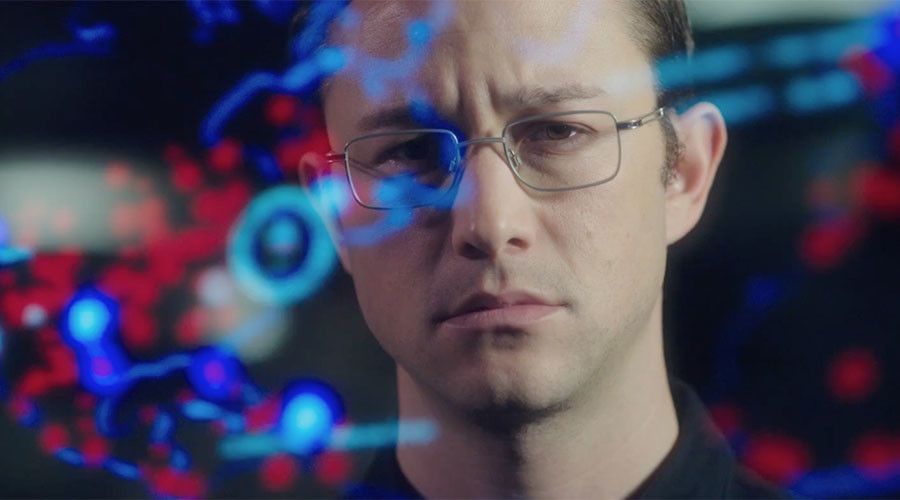Photo from thewrap.com
By Carrie Parker
Contributing Editor
“Snowden”
Director: Oliver Stone
Release Date: September 16, 2016
Like everyone else on campus, my friend and I found ourselves on Thursday in dire need of a study break. But how to best escape the deluge of work? It was a toss-up between Storks and Snowden, but only a few seconds into the latter’s gripping trailer, it was a no-brainer which we would see.
The film opens with a disclaimer: it is a dramatization of events from 2004 to 2013. The story continues to unfold today, with Snowden seemingly eternally holed up Russia and virtually no progress in granting him impunity, despite his lawyers’ campaigns and work by the |American Civil Liberties Union (ACLU). As a former CIA employee and NSA contractor who leaked classified information in 2013, Snowden has been called a hero and a traitor with equal fervor on both sides. Reviews have been mixed, though that is to be expected with the immense controversy surrounding this cinematic portrayal of a true story.
Leading the cast, Joseph Gordon-Levitt in every way becomes Ed Snowden, nailing the computer prodigy’s mannerisms, tics and tone of voice to such a degree that the real Snowden’s cameo at the film’s conclusion could almost go unnoticed (almost).
Despite her low-profile in the real world, Snowden’s girlfriend, Lindsay Mills (played excellently by Shailene Woodley), was an integral part of the film, which follows the peaks and valleys of their relationship - the frustration and pain, the defense and betrayal, the love and heartache - as much as it follows Snowden’s subversive yet valiant mission.
The plot unfolds mainly through flashbacks, periodically returning to the present in 2013, in a hotel room in Hong Kong where Snowden has gathered Glenn Greenwald, Laura Poitus and Ewen MacAskil, entrusting these journalists with the documents he stole from the NSA, as well as with his personal tale leading up to that pivotal moment.
Snowden’s first flashback to army training in Fort Benning, Georgia in 2004 comes to an abrupt end with a broken leg. The doctor tells Snowden he will be discharged, but assures him, “There are plenty of other ways to serve your country.” These words gain greater meaning as Snowden’s quest unfolds during the next two-plus hours, as he is undisputedly cast by the film and by himself as a hero to our country.
Painting Snowden in this heroic light, the film caused me to wonder, can a movie such as this fairly and accurately help people make a decision about Snowden’s present situation? The dramatization and storyline make me inclined to say no. What a thrilling docudrama such as this can do, however, is really get its audience to start asking questions. Leaving the theater, I was bursting. Can you be a patriot while you protest your government? How does the Fourth Amendment apply to government intelligence? Is terrorism a short-term threat as Snowden’s fictional CIA mentor Corbin O’Brian (unsubtly named after the antagonist in Orwell’s “1984”) says, and should we be focusing elsewhere? Could an ordinary job become criminal - as a discussion among NSA employees asks, like Nuremberg? Should we care that the NSA has potentially unlimited access to ordinary people, even if, as Lindsay protests, we have nothing to hide?
For Snowden, that’s not the point. His troubled conscience grows and his disillusionment accelerates as he realizes the actions of the government serve for economic and social control, with terrorism as a convenient excuse.
Snowden emphasized how he wanted to get the data to established journalists so that they could lead the public through the complexity. “The the people can decide either I’m wrong or there’s something inside the government that’s really wrong.”
Snowden also named his greatest fear: What if nothing changes?
So what do we make of this man, whom the film portrays as a man who sacrificed his good life, but is proud of what he did for the people?
The debate over Snowden’s unprecedented actions and the complexity of his journey made this venture a tremendous undertaking for Director Oliver Stone, who glossed over in the typical Hollywood fashion all the excruciatingly dull work of reading and deciphering the NSA documents Snowden procured at great risk-and which was at the heart of his mission and the role of the journalists who helped him. Yet with the geo-hopping, romance, techno music and cyber-thriller vibes, who can really complain?
Whether the film is more documentary or drama niggled at the back of my mind for the entire duration. As reported in Irina Aleksander’s New York Times Magazine feature “The Snowden Plot,” that genre tug-of-war played out between Stone and Gordon-Levitt, whose approach Stone sometimes found too “documentary-ish.” “I was trying for the dramatic side as much as possible,” Stone explained, and it is safe to say that came through loud and clear.
But does stoking the drama mean the tale is any less true? Perhaps a movie is the best means of cementing Snowden’s story into our minds. Was the goal of the film to change public perceptions of Snowden, or was it something else? It all depends on who you ask-from the director, to the lawyers, to the journalists, to Snowden himself. Will the film try to sway you? Unequivocally, yes. But no matter your perception of the whistleblower/renegade, the film is sure to thrill. So why not take a study break, get yourself a ticket and see for yourself?
See the film’s trailer below.


